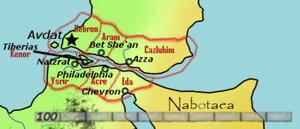Nabotaea
| Nabotaea | |
|---|---|
| Capital City: | Avdat |
| System of Governance: | |
| Leader(s) | |
| Primary Religion: | |
| Languages | |
| Majority Races | |
| Strong Minorities | |
| Real World Influence: | |
Overview
High Level Overview of the place
Culture
Religions
Modern Nabotea is a cultural mash from those countries that treated to keep the current peace. Additionally, customs fall in and out of vogue as ownership of the various lands along the Azar changes hands between individuals of different nationalities and backgrounds.
Native Naboteans mainly venerate a small pantheon of goddesses related to herd, hearth, and harvest.
Social Structure
How the society is structured
Customs and Holidays
What days matter to the people
Arts and Exceptionalism
Politics
Government
Organization of the Land
How the power structure is divided regional (i.e. Duchies, Baronies, Lordships, etc.)
Demographics
Economy
Foreign Relations
Due to the treaties that compose the Azar, international relations are cordial, with occasional diplomatic flare ups. Though unlikely to ever come to blows, the shifting political landscape of forcing any number of countries to work together can be difficult to navigate.
History
History since the Dragon Wars
Early History
National History
In the early years after the Dragon Wars the Nabotaen people were a small scale herding population clustered around the Berrylian Gulf-side mouth of a narrow sea passage that spanned the thinnest stretch of the Coda landmass from the Berrylian Gulf to the Vedian Gulf. A few hundred years before the rise of Thracia, intrepid adventurer Azariah explored the full 400+ mile length of the channel, finding a strange and wondrous sea on the far side, and while there, meeting strangers from a far off land with different sorts of goods to sell. He came back and told his people "We will make this accursed salty waterway into our meal ticket, folks!" and they set about expanding along it, turning more to farming and of course to trade. There were several very narrow stretches, schoals that were so shallow that low tide bared many rocks, sandbars, and impassible obstacles - and the Nabotaeans became experts at portage, ferries, and other means to help facilitate trade through to the Orient. Pay to play, easy to control, wealth poured in.
Their cleverness was not to be unrewarded: Sassania, Ghassania, Uthmanli, Hispalis, Abruzzo, Malay, and Thracia all took turns conquering the place. Thracia of course made the largest and most lasting impact, employing their signature talent for infrastructure they dragged, dredged, blew up, and basically re-shaped the entire corridor turning it into a veritable highway for trade ships to go straight through to the lands beyond. This made the land EVEN MORE VALUABLE and Thracia clung to its claim their tenaciously before petering out.
There have been periods of fighting of Nabotea and control of The Azar (a.k.a. the Azar Channel) for most of its history. Its own native inhabitants seldom seem to hold it for long before someone else is conquering them, or they enlist the aid of one country to overthrow another and then end up subject to its will. A few brief patches have had them independent but not many.
The competition was fierce and ultimately modern relations between the greater nations saw that the continual state of warfare in Nabotaea was eating into everyone's profits from ownership of it. No one could keep the damn thing locked down, and enough centuries of debating it made it ultimately clear that they had to have a better option.
It was something of a work of diplomatic magic and legal fiction: Nabotaea would be given control of its own land - the countries signatory to the treaty would agree not to invade it any more in exchange for preferential tariff status on goods transported through the Azar. They also agreed to defend Nabotaea against any other non-signatory invaders, and the combined might of the treaty parties is substantial enough to make other major nations willing to suffer the tariffs rather than invade on their own.
Wealth generated by Nabotaea through its tolls on the Azar would be sharply decreased from signatory countries but remain more than enough to keep the country prosperous. Other concessions were made for signatory allies and so on. But here's the wicked bit: the wealth generated by tolls would be distributed to the landed gentry who owned lands ON the Azar itself, in a complex system of proportions. And many of those landowners were naturalized foreigners who had through various occupations and such become permanent residents with control of large amounts of land. So the Nabotaean people themselves, despite being given "Their Country Back" were still not to wreak much profit from it, as massive corporations of wealthy imported nobility control a plurality of the waterfront properties of greatest value and their own farmlands and such remain only marginal. Many live as second rate citizens in their own country, though at least it isn't getting burned down all the time any more.
Major Modern Events
What events will have shaped the experience of characters having grown up there
Geography
The Azar, Deep Sands (An area of fine silicate that is in the desert to the east of the Azar. Unlike the Azar itself, it is difficult to reach and had been significantly less exploited by outside influence.)
